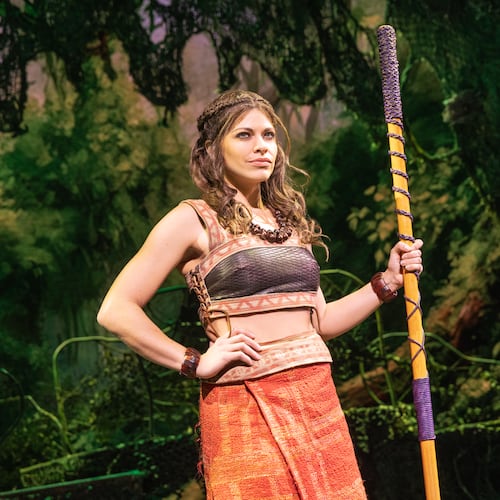EVENT PREVIEW
Breast Strokes’ Big Reveal
8-11 p.m. Feb. 20. Tickets purchased by Feb. 12: $36 for those 36 and under; $54 per person for others. Tickets after Feb. 12 are $65. The Stave Room at American Spirit Works, 199 Armour Drive N.E., Atlanta. 678-443-2961, www.hadassah.org/atlanta.
Last week, Alana Schube traveled to Houston with her mother, Maxx, so doctors at the MD Anderson Cancer Center could remove the tumor she discovered recently from her left armpit.
It was her second such surgery in less than two years. The first, in September 2014, was for a double mastectomy that was followed by eight brutal rounds of chemotherapy.
This is not how Schube, 24, imagined her life, but as an Ashkenazi Jew, she learned a long time ago that there was a good chance breast cancer was in her future. One in 40 Ashkenazi Jews test positive for the BRCA1 gene, compared to 1 in 345 in the general population.
Both Alana’s mother, Maxx, and her older sister, Rochelle, had tested positive as well.
It isn’t the kind of thing you’d want to bring attention to yourself, but, well, the courage to get through the waiting and diagnosis and the contradictory and confusing medical advice is worth far more than a mention.
And so on Feb. 20, the women’s volunteer organization Greater Atlanta Hadassah will pause for a moment to honor the Schube women.
"This is a way for us to highlight this wonderful family who wants to give their struggle meaning by educating others and by raising funds to continue to do research so that others won't have to deal with this," said Sue Rothstein, who with Annie Kohut is co-chairing Breast Strokes, a two-part event that raises funds for breast cancer and genetic research programs at Hadassah Hospital in Jerusalem, and for breast cancer education, advocacy and prevention in the United States.
Part 1, Paint Day, is held during Breast Cancer Awareness Month in October, when volunteer models — many of whom are breast cancer survivors — are body-painted from neck to navel. Their torsos are then photographed and made into unique works of art.
Part 2, The Big Reveal, is the fundraising gala, where this year the Schube women will share their story.
Days before heading to Houston, Alana and Maxx sat in their kitchen on a quiet Sandy Springs street, hoping to impart two messages. One, get tested for the BRCA gene mutation, especially if you are Ashkenazi, men included. And two, no matter what your doctor tells you, trust your gut.
The Schubes' battle with cancer began some 20 years ago when Maxx's sister and Alana's godmother Beverly was diagnosed with ovarian cancer.
Doctors believed Beverly, who was 33 at the time, had a cyst but soon learned she had ovarian cancer. She died in 1996.
When a doctor suggested Maxx be tested for the gene, she put it off, believing Beverly’s diagnosis was an isolated event. Then in 2002, she was in a carpool line at her children’s school playing with a necklace when she felt a lump and decided to get checked out.
Two days later, doctors gave her the news. Her biopsy was positive.
The BRCA gene in Maxx’s father had reared its ugly head in his daughters and, as they’d find out later, his granddaughters.
Maxx was 40 when she tested positive for the gene. Rochelle was 23. And Alana just 21.
All three have undergone double mastectomies. In April, doctors declared Alana cancer-free and told her to “go live your life.”
She gave it her best shot, but Alana couldn’t shake her fear of a recurrence. In October, less than six months later, she felt another lump in her left armpit, the same side as the original cancer. An ultrasound and biopsy confirmed the cancer was back.
After completing another round of chemotherapy last month to shrink the tumor in Atlanta, she and Maxx took a Delta flight to Houston, where she was scheduled to undergo surgery on Feb. 1.
They returned home just days later in good spirits, ready to fight on, to do their part helping Hadassah educate and advocate for others; to raise badly needed funds for research.
Maxx Schube said sometimes she still finds it hard to believe breast cancer has struck her family thrice. She always believed her daughters would marry and have kids before they had to face cancer.
“Who was it that said people make plans, God laughs,” she quipped.
The Schubes are still making plans, albeit with a little less focus on themselves, and so they are grateful for this moment from and for Hadassah, one of the oldest and largest Jewish women’s organizations supporting research on BRCA.
For years, the Hadassah Medical Organization has been doing research with the BRCA gene mutations, which significantly increase a woman’s risk of developing breast cancer. Of particular note is the in-vitro technology Hadassah developed in 1996 that allows babies of defective-gene carriers to be born mutation-free and a blood test that makes it possible to predict the presence of the harmful BRCA1 and BRCA2 mutations in otherwise healthy women.
“It’s our hope that the funds raised through our event will help to allow the Hadassah Medical Organization to continue this kind of groundbreaking research,” Kohut said.
No one would ever choose to have breast cancer, Maxx told me. “But if we have to go through it,” she said, “at least we can use our story to educate other women and even doctors.”
About the Author
Keep Reading
The Latest
Featured

